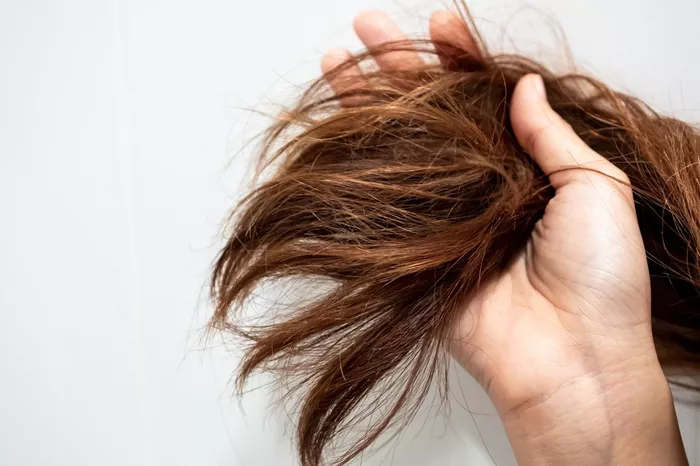Frizz can be a common hair concern, particularly on the ends of hair. The reasons behind this frustrating issue can be numerous and understanding them is the first step towards managing and preventing frizz. This article will explore the various factors that contribute to frizzy hair ends and offer practical solutions to keep your hair smooth and healthy.
Why Is My Hair Frizzy on the Ends?
Moisture Imbalance
Hair needs a proper balance of moisture. When hair lacks moisture, it becomes dry and prone to frizz. The ends of the hair are the oldest and most exposed part, making them more susceptible to dryness. Conversely, too much moisture can also lead to frizz. Hair absorbs moisture from the environment, causing the cuticles to swell and lift.
Environmental Factors
Humidity is a significant factor. High humidity levels cause hair to absorb moisture from the air, leading to swelling of the hair cuticles and frizz. Conversely, very dry conditions can strip hair of its natural moisture, causing dryness and frizz.
Heat Damage
Frequent use of heat styling tools such as blow dryers, flat irons, and curling irons can damage the hair cuticles. Heat opens the hair cuticles, leading to moisture loss and making the hair more prone to frizz. Damaged cuticles cannot lie flat, causing the hair to look frizzy.
Chemical Damage
Chemical treatments like coloring, perming, and relaxing can weaken the hair structure. These processes alter the natural state of the hair, often stripping it of its moisture and damaging the cuticles. This damage can cause frizz, especially on the ends of the hair.
Physical Damage
Rough handling of hair, such as vigorous brushing or towel drying, can cause physical damage to the hair cuticles. Damaged cuticles do not lie flat, leading to a rough texture and frizz. Additionally, split ends, which are a form of physical damage, can also cause frizzy ends.
Lack of Proper Hair Care
Neglecting regular hair trims can lead to split ends and frizz. Additionally, not using appropriate hair care products that provide moisture and protection can exacerbate frizz. Using products that contain harsh ingredients like sulfates can strip hair of its natural oils, leading to dryness and frizz.
Genetics
Genetics play a significant role in hair texture and behavior. Some people are naturally more prone to frizz due to the shape and structure of their hair. Curly and wavy hair types are more susceptible to frizz because the natural oils from the scalp have a harder time traveling down the hair shaft.
SEE ALSO: How to Care for Thin Hair?
Solutions for Frizzy Hair Ends
Regular Trims
Getting regular trims is essential. Trimming the hair every 6-8 weeks helps remove split ends and prevent them from traveling up the hair shaft, reducing frizz.
Moisturize
Using a good conditioner is crucial. Conditioners help replenish moisture, smooth the hair cuticles, and reduce frizz. Deep conditioning treatments once a week can provide extra moisture and nourishment.
Protect from Heat
Using heat protectant products before heat styling is essential. These products form a barrier that protects the hair cuticles from the damaging effects of heat. Limiting the use of heat styling tools can also help reduce frizz.
Gentle Handling
Handling hair gently is important. Use a wide-tooth comb to detangle wet hair and avoid rough towel drying. Instead, gently squeeze out excess water and use a microfiber towel or an old t-shirt to blot the hair dry.
Use the Right Products
Using products designed for your hair type can make a significant difference. Look for shampoos and conditioners that are sulfate-free and designed to provide moisture. Leave-in conditioners and serums can help seal the cuticles and reduce frizz.
Hydrate
Keeping the hair hydrated from the inside out is important. Drinking plenty of water and maintaining a healthy diet rich in vitamins and minerals can promote healthy hair.
Protect from the Environment
Using protective hairstyles and accessories like hats or scarves can help shield the hair from harsh environmental factors. Anti-humidity sprays and serums can also provide a protective barrier against humidity.
Avoid Over-Washing
Washing hair too frequently can strip it of its natural oils, leading to dryness and frizz. Washing hair 2-3 times a week is usually sufficient for most hair types. On non-wash days, dry shampoos can help keep the hair fresh.
Home Remedies
Incorporating natural oils like coconut oil, argan oil, and olive oil into your hair care routine can help combat frizz. These oils provide deep moisture and help seal the cuticles. Applying a small amount to the ends of the hair can make a noticeable difference.
Professional Treatments
Seeking professional treatments like keratin treatments or hair botox can provide long-lasting frizz control. These treatments smooth the hair cuticles and provide deep conditioning, reducing frizz for several weeks to months.
Sleep Care
Using a silk or satin pillowcase can help reduce friction while sleeping, which can minimize frizz. Tying the hair in a loose braid or bun can also prevent tangling and frizz.
Conclusion
Frizzy hair ends can be frustrating, but understanding the underlying causes and implementing proper hair care practices can significantly reduce frizz. Regular trims, proper moisturizing, gentle handling, and using the right products are key to maintaining smooth, healthy hair. By taking these steps, you can keep your hair looking its best and minimize frizz on the ends.

